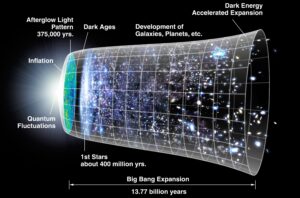What Is The Cosmological Argument?
The cosmological argument is a philosophical argument that seeks to prove the existence of God through the observation of the universe’s origins. It is based on the idea that everything that exists must have a cause, and that this cause must itself have a cause, leading ultimately to an uncaused cause that we call God.
- The cosmological argument aims to prove God’s existence by tracing the cause of the universe to an uncaused cause, often divided into versions like Kalam, Thomistic, and Leibnizian.
- These versions share the premise that the universe’s existence necessitates a divine cause.
- For Christians, the cosmological argument supports the idea of God as the universe’s creator, aligning with biblical teachings in Genesis and John.
It is often divided into several different versions, each with its own nuances and strengths. These include the Kalam, the Thomistic, and the Leibnizian cosmological argument.

Big Bang Timeline
Kalam Cosmological Argument
The Kalam cosmological argument, for example, argues that everything that begins to exist must have a cause. Since the universe began to exist, it too must have a cause, which is necessarily God.
Thomistic Cosmological Argument
The Thomistic cosmological argument, on the other hand, argues that all things in the universe are contingent, meaning that they could have existed or not existed. Since contingent things must be caused by something else, there must be a necessary being that causes them, which is again God.
Leibnizian Cosmological Argument
The Leibnizian cosmological argument takes a slightly different approach, arguing that there must be a sufficient reason for the universe’s existence. Since the universe cannot be self-explanatory, there must be a necessary being that provides this explanation, which is again God.
While these arguments may differ in their details, they all share the same basic premise: that the existence of the universe requires a cause, and that this cause must be God.
The Cosmological Argument & Christianity
For Christian believers, the cosmological argument holds particular significance. It provides a powerful tool for demonstrating the existence of God and the rationality of Christian belief.
In the Bible, the idea of God as the creator of the universe is central to Christian theology. In the book of Genesis, God creates the world in six days, establishing himself as the ultimate source of all things. Similarly, the Gospel of John proclaims that “in the beginning was the Word, and the Word was with God, and the Word was God. He was with God in the beginning. Through him all things were made; without him nothing was made that has been made” (John 1:1-3).
The cosmological argument thus provides a way of explaining and defending these biblical teachings. By demonstrating the need for an uncaused cause, it shows that the existence of the universe is not simply a matter of chance or coincidence. Rather, it points to a deliberate act of creation by an intelligent and powerful God.



